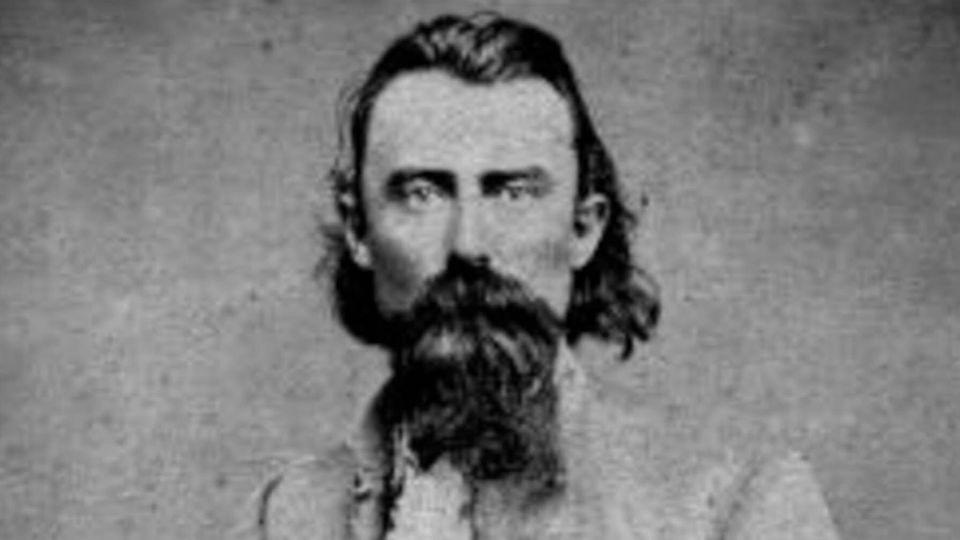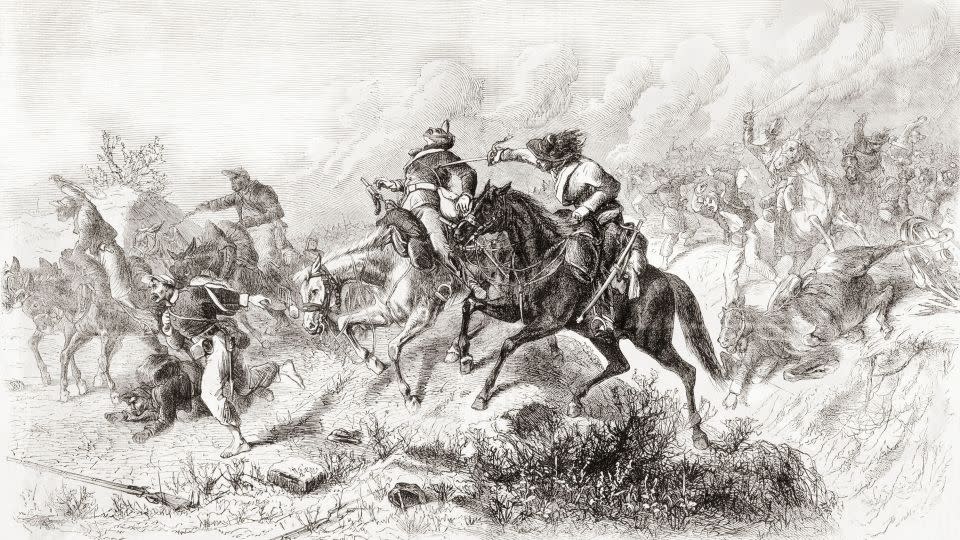The Texas park Trump is visiting has a surprising history
- Oops!Something went wrong.Please try again later.
- Oops!Something went wrong.Please try again later.
Shelby Park in Eagle Pass, Texas, has become a staging ground for state forces, the epicenter of a standoff with the federal government and a stark symbol of dysfunction at the border.
Former President Donald Trump toured the park with Texas Gov. Greg Abbott Thursday and slammed the Biden administration’s immigration policies from a podium there.
We’ve heard a lot about the ongoing legal battle over immigration in this border city, and the Republican presidential candidate’s long-running crusade to toughen enforcement at the border.
But there’s a surprising story about this park that’s far less well known.
The 47-acre park along the Rio Grande was named after a Confederate military leader who fled to Mexico in 1865 rather than surrendering to Union troops.
A Federal Emergency Management Agency case study describing the park notes that it was named for General Joseph Orville Shelby, known to some as the “undefeated rebel.”

“What struck me about it is the irony of all this,” says historian Jeremi Suri, who wrote about Shelby and other Confederate exiles in his 2022 book, “Civil War by Other Means: America’s Long and Unfinished Fight for Democracy.”
Most people likely aren’t familiar with Shelby’s story. But there’s a clear resonance between this moment and Shelby’s rarely recalled chapter of American history, Suri says.
“I see those attitudes now as well,” says Suri, who holds the Mack Brown Distinguished Chair for Leadership in Global Affairs at the University of Texas at Austin. “The reason these exiles are important is they kind of (are used to) legitimize this discussion of secession…which is really sticking your middle finger up at the federal government and saying, ‘we’re going to do it our way, and you can’t make us do it differently.’”
The park’s name, Suri says, reveals more about the current dispute than any argument in the immigration debate.
“What this is really about is about power for groups that have power and don’t want to give up power. The naming of that park, rather than naming it Martin Luther King Jr. park or Cesar Chavez park, was an assertion of power, and the irony is that assertion has now become militarized in that space again,” he says.
How a Texas border city became known as the ‘grave of the confederacy’
In the prologue to his 2010 book “General Jo Shelby’s March,” the late historian Anthony Arthur painted a dramatic picture of Shelby and his troops leaving Eagle Pass and heading south. As the group stood in the Rio Grande, they plunged the Confederate battle flag into the river rather than letting Union forces get their hands on it.
“He withdrew the black plume from his hat brim and laid it gently within the folds of the flag before it vanished beneath the muddy water,” Arthur wrote.
Local historian Jeff Taylor Sr. says rumors have swirled over the years that the flag was later retrieved from the waters. But the myth of that moment has endured, earning a nickname for Eagle Pass as the “grave of the Confederacy.” For years, a painting depicting the scene hung in the Eagle Pass City Hall. Reenactors would even travel to the border city to relive it.
“It was just something kind of famous. … Nobody really thought about it,” Taylor told CNN.
Taylor, 67, grew up in Eagle Pass and takes pride in knowing and sharing the city’s history. For years he was the curator at the city’s Fort Duncan Museum.
Taylor says he isn’t sure when exactly Shelby Park got its name, or who was behind the effort to name it. One thing he is sure about: Most residents of Eagle Pass aren’t familiar with the history behind the man the park was named for.
“I’ll ask people, ‘Do you know who Shelby is?’ They’ll say, ‘I never heard of him. Did he play football with the Eagles?’” Taylor says, referring to the local high school team. “They just have no idea.”

A colony in Mexico was home to hundreds of exiled Confederate soldiers
Eagle Pass may have become known as a graveyard for the Confederacy, but for Shelby and the troops who accompanied him into Mexico that day in 1865, their cause lived on. Maximilian I, the French-installed emperor ruling Mexico at the time, rejected the group’s offer of military services, but provided them land for a colony of exiled Confederate soldiers that was known as La Carlota, after the emperor’s wife.
The group’s time in Mexico was short lived. By 1867, the year Maximilian was executed, Shelby and most of his followers had returned to the US.
“He comes back to the US and declares himself a hero because he never bent his knee to Yankee power,” Suri says.
The next year, President Andrew Johnson pardoned all Confederate soldiers. And decades later, President Grover Cleveland appointed Shelby as U.S. marshal for the Western District of Missouri.
Suri says he’s not aware of when or why the Eagle Pass park was named after Shelby.
The case study on FEMA’s website says the park was built in the late 1990s as part of a mitigation plan after flooding in the area. If that’s when the park got its name, the timing would dovetail with a revival of neo-Confederate groups in pockets across the US, Suri says, but it’s unclear whether there was a connection.
Some activists see a connection between what’s happening today and the park’s name
Last month, the Texas Attorney General argued that state authorities had seized Shelby Park from the city “for law-enforcement and disaster-relief purposes.” State officials claim they were forced to take action after large numbers of migrants arrived in the area, and they argue that federal authorities still have access to the park for medical emergencies — something the Biden administration has disputed in court filings.
Last year, Texas officials sued the Biden administration for cutting razor wire at the border. And last month the Supreme Court ruled that Border Patrol agents could remove razor wire installed in the Eagle Pass area as part of Texas’ Republican governor’s security initiative while the state’s legal challenge to the wire-cutting plays out.
The Department of Homeland Security has demanded Texas give it “full access” to the border, arguing that immigration enforcement is a federal matter. Gov. Greg Abbott and other Texas officials have vowed not to back down.
“It’s ironic that it’s in this park,” Suri says. “No one planned that.”
Still, some local activists, like Amerika Garcia Grewal, say they see clear symbolism connecting the park’s name with what’s currently unfolding there.
“It’s appropriate that a symbol of racism should be so covered in concertina wire. It’s like an outward manifestation of the hate that others feel,” she says.
Garcia Grewal is the cofounder of Border Vigil, a group that’s been meeting regularly in Shelby Park to honor the lives of migrants who died in the Rio Grande.
Weeks before the recent state takeover of the park, the group planted hundreds of crosses in a field there as a memorial to the people believed to have perished along the US-Mexico border in 2023.
“It was over half an acre of land that was covered by all these crosses. It’s incredibly powerful to realize that human actions killed this many people. … Our policies are basically condemning people to death,” she says.

In recent years, Garcia Grewal says she and others have petitioned for officials to change the names of places honoring Confederate leaders in Eagle Pass. An elementary school previously named for Robert E. Lee started the 2021-2022 school year with a new name after a unanimous school board vote.
But Shelby Park’s name has stuck. And some in Eagle Pass don’t see any reason to change it.
Taylor says name changes that aim to erase history rather than learn from it aren’t the right path.
“That was history,” he says. “We don’t want to forget it.”
Garcia Grewal says the recent standoff in Shelby Park has renewed her desire for a new name for the park where she and other classmates grew up playing sports and going to festivals.
“It’s a name that hate rallies behind,” she says. “I definitely think now more than ever we need to change the name of the park.”
It’s unclear whether upcoming festivals scheduled for the area will go ahead as planned. At a news conference earlier this month, local community members and advocates called for state officials to return the park to the city’s people.
“They’ve taken over a publicly funded park – our park, our history, our culture. That is where we convene. That’s our green space. That is where we are connected to the river, and we don’t access to it,” Eagle Pass resident Jessie Fuentes said. “I want my park back. I want my river back.”
Texas Gov. Greg Abbott has held numerous border security briefings at the park since state officials seized control of it. At one of them, he recently announced plans to build an 80-acre military base nearby. But for now, the park remains a focal point of his administration’s efforts, and a flashpoint in the national immigration debate.
Nearly 160 years after the Confederate general it’s named for refused to surrender, Shelby Park remains fenced off with gates and razor wire.
This story has been updated with details about former President Donald Trump’s planned visit. CNN’s Alayna Treene, Rosa Flores and Sara Weisfeldt contributed to this report.
For more CNN news and newsletters create an account at CNN.com

